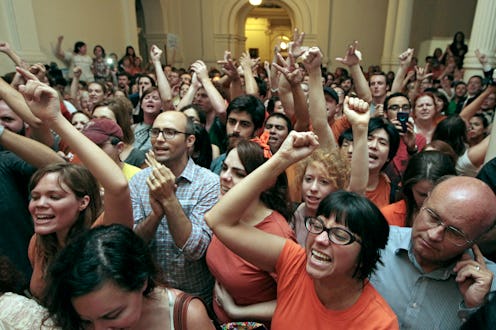Life
Not Everyone Who Needs Abortions Is A Woman
Over at Truth Out, Lauren Rankin writes about an often-neglected side of the abortion debate: the fact that people who do not identify as women are also people who need abortions.
If you've been following the recent goings-on about abortion rights all over the country, it's likely you've seen the slogans, "Stand With Texas Women," "Stand With NC Women," "Stand With Ohio Women." While I'm all for fighting these oppressive, sexist laws that will limit the availability of abortions in those states, the terminology of "woman" markedly leaves out transpeople (specifically, transmen) and other genderqueer people who may need abortions.
Rankin writes:
We must acknowledge and come to terms with the implicit cissexism in assuming that only women have abortions. Trans men have abortions. People who do not identify as women have abortions. They deserve to be represented in our advocacy and activist framework. Honestly, I am guilty of perpetuating that harmful myth, both in my rhetoric and framing. I often frame abortion restrictions as misogynistic attacks meant to control women's reproductive lives, and that is true. But abortion restrictions also affect the lives of people who aren't women, and they hinder trans men and gender-non-conforming people and others who were Designated Female at Birth (DFAB) from accessing abortion care, as well.
So true, and such a vital argument, one that I think the majority of people (including pro-choice activists) don't often pay attention to. I naively like to think that people have become more open-minded about trans issues, less wedded to the gender binary, but even in progressive feminist circles, it's still clearly a large issue.
I guess some people might argue that being careful about the language used to fight anti-choice laws is distracting from the issue at hand, but I personally don't see how creating an environment of inclusivity within a common goal can be at all destructive. Yes, it's true that anti-choice legislation can predominantly affect the concerns and lives of biological females, but that doesn't mean it's fair to leave others out of the framework and out of the discussion.
I couldn't agree more with Rankin when she says:
Beyond that, we should begin to accept and grapple with, on individual and community levels, what it means to frame abortion as a women's issue and why we continue to be so reluctant or unable to be more gender inclusive. This requires effort, yes, but it is essential to our work and to a deeper understanding that reproductive justice does not only apply to women, but to all people. All people who need an abortion should be able to access one, and that does not solely apply to women.
Rankin suggests that the pro-choice movement begin by listening. I'm a pro-choice, female-identified, cisgender woman, and I'm listening. Are you?
